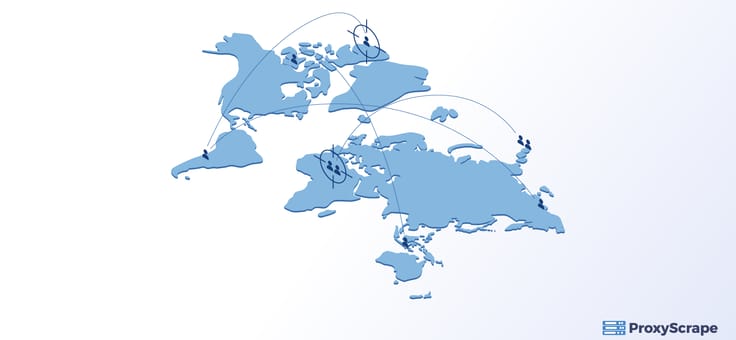
Without a doubt, affiliate marketing is a lucrative business to be part of. However, affiliate marketing involves many challenges. These challenges are evident with the rise of affiliate fraud on the one hand. Then, on the other hand, lack of a mechanism to test affiliate links in case of geo-targeting. If you are an ambitious
Without a doubt, affiliate marketing is a lucrative business to be part of. However, affiliate marketing involves many challenges. These challenges are evident with the rise of affiliate fraud on the one hand. Then, on the other hand, lack of a mechanism to test affiliate links in case of geo-targeting.
If you are an ambitious affiliate marketer, you may want to overcome all the barriers and become successful at them. That is where this article would help you. It will discuss the significant obstacles to affiliate marketing and then the solutions for you to become successful.
Before that, let’s focus on why you need to test affiliate marketing campaigns.
Why do you need to test Affiliate links?
As we just discussed above, affiliate marketing has driven plenty of revenue to the digital marketing arena. Up to 15% of revenue for digital marketing stems from affiliate marketing. In fact, during the pandemic period, 42% of affiliate publishers have recorded a rise in site traffic.
Affiliate marketing success is contingent on the capacity of your affiliate links to convert and the absence of affiliate fraud.
You may place the affiliate links in a blog post and hope they convert. After several weeks or months, you understand that your affiliate links aren’t operating as intended when you don’t receive your commission or handsome paycheck from your affiliate partner.
In actuality, you’ll seldom come into scenarios in which affiliate links perform as predicted.
In certain circumstances, you’ll come across broken links, while in others, links will serve different content to different audiences based on their location. As a result, it’s critical to test your affiliate links.
You never realize the devastating implications of affiliate fraud on you, aside from the harmful effects on affiliate links. In 2020, for instance, affiliate fraud was worth $1.4 billion, and digital marketing experts believe that the figure would escalate.
So, below is what you should test in your affiliate marketing campaign.

What parameters do you need to test in affiliate marketing?
Broken or dead links
These may occur due to:
- Affiliate program closes
- Affiliate company switches their program
When they occur, not only you’ll lose revenue, but it would provide a bad experience to the users who would think that your content is not up to date. So you would constantly and continuously need to test the affiliate links automatically.
You may test the links manually, but to speed up the process, you would prefer automation of link testing. Perhaps you may need a proxy!
Well, if you would like to test whether your links are broken or not, there is plenty of software to do so. A proxy may not be a viable option in such circumstances. However, a proxy would be of great assistance to what we will discuss in the next section.
Geo-targeting
When a user clicks on an affiliate URL, the content shown to that user may differ from content shown to another user, depending on the user’s location. This is generally how affiliate marketing works by offering different content to different areas.
On the other hand, you may find that some websites are blocked in certain countries, which may also apply to affiliate links.
So, as an affiliate marketer, you need to test whether the right content is appearing for the appropriate user—this, together with blocked websites, is solely possible with proxies, which you will find out a little later.
In the next section, you”ll discover how affiliate fraud occurs and some of the valuable tips which you can use to identify them. Before that, let’s dive into what affiliate fraud is.
What is Affiliate Fraud?
Any dishonest or unethical practice that an intruder or a fraudster carries out in order to obtain commissions from an affiliate program is an affiliate fraud.
Usually, when a customer purchases through an affiliate link that leads to the seller’s website or registration page that further leads to the purchase page, the affiliate will get their commission. Cookies are the ones that track this process. However, the fraudsters always find ways to manipulate the clicks and earn commission by artificially boosting the traffic.
Let’s look at one of the most prominent affiliate frauds out there:
Click Fraud
Click fraud is one of the significant roadblocks to affiliate marketing success, and it primarily affects the firm that offers the goods. When an individual, who may be a rival of your affiliate partner, an automated bot, or a script, clicks on your affiliate link to deceive your affiliate partner, click fraud occurs.

The perpetrator may then use phony credit card information and deploy bots to automate the registration of sign-up forms. Ultimately, this would result in a massive transfer of funds to the fraudsters.
Fortunately, you can utilize proxies to combat this type of scam.
Now let’s focus on some of how affiliate fraud occurs:
How does affiliate fraud occur?
Cookie Stuffing
Usually, the host websites set up browser cookies to provide visitors with a unique browsing experience. Unfortunately, some vicious people abuse cookies.
Cookie stuffing is the process that occurs when a website places dangerous third-party cookies on a visitor’s browser. As a result of these cookies, the merchant website transfers money to the fraudster’s account. As a result, affiliates lose money to fraudsters even though they made a sale to the firm through legitimate site traffic.
In the vast majority of cases, website owners are completely unaware that cookie stuffing is going on. They primarily employ a chatbot that installs third-party cookies on visitors’ browsers without their knowledge.
Cookie stuffing eventually causes affiliates to lose interest in the business and abandon their efforts.
Malicious adware
Unintentionally, website users download harmful software that appears as pop-up windows or other forms of advertising fraud. This malware infiltrates the browser of the user. The affiliate’s traffic counts are subsequently falsely inflated and reported to the merchant’s website.
Loyalty software is another type of malware that affiliates commonly use and fraudsters manipulate. Affiliates typically install this on a user’s computer to inform them of the benefits and money they will receive when purchasing things from specified merchant websites. When a user visits a merchant’s website with this software installed, all of the information is available.
On the other hand, fraudsters will, as is customary, claim the commissions they earned unfairly.
URL Hijacking
Also called Typosquatting is a method that entails registering domain names that are almost identical to the merchant’s actual domain names.
URL hijacking is divided into five categories: abuse of the country code top-level domain, single or plural form of a domain name, regular misspelling of the target web site’s name, alternative top-level domain names, and misspelling based on a typographical error.
As a result, if a user misspells the URL, the intruder will direct them to the merchant’s website via the wrong domain. As a result, the quantity of affiliate redirection referrals will rise.
.
Why do you need proxies for Affiliate Link Testing?
You now understand why you should test affiliate links. Let’s look at how you can use proxies to test some of these causes.
Multiple Link Testing
When you have multiple affiliate links to test, you would be tempted to use automated software. These bots would seem to be suspicious of websites which could result in bans.
So in such circumstances, when you use rotating proxies, they will change the IP address for each link, and you’ll be made to look like a real user when testing.
Geo-targeting

For geo-targeting, you need residential proxies belonging to multiple countries to test how the content appears based on the location. Since the IP addresses have geo-locations attached to them when you connect with a proxy server of a particular country, your actual IP address will be masked.
You can also use proxies to test if your affiliate links are blocked in certain countries due to governments censoring websites or banning content based on location.
Another aspect of using proxies for geo-location testing is localization testing. With this form of testing, you can test whether the content appears relevant to the language, local currency, and any other relevant local information according to the location.
Affiliate fraud detection
You just saw how click frauds could negatively affect your affiliate marketing campaign. Proxies could once again be your savior in such circumstances. With high-quality proxies, you would be able to detect malicious traffic and differentiate bot activities from human activities.
Furthermore, by connecting to proxies from multiple locations, you would determine from which countries or regions the malicious traffic is emerging.
In addition to click fraud, you can verify if the affiliate program you’re engaged in actually records your transaction before paying you the commission. This is necessary as you may never know that your affiliate partner may be committing fraud. So what better way to test it using proxies than by making some arbitrary purchase.
Website Performance
It is the responsibility of the web administrator to ensure that they test the performance of the website without having it blocked. One way they could achieve this is by carrying out the tests by turning off the anti-botting system. However, this would be a bad practice, enabling the bots to get into the system.
So a better option to test the website performance is by using rotating proxies. It would enable you to rotate proxies with different IPs and pretend as malicious guys and see how the website performs.
To keep an eye on your affiliates
Furthermore, if you want to keep an eye on your affiliates on whether they’re being destructive or not, proxies would be your first choice. You can monitor them with ease without them realizing it.
Which proxies are best suited for Affiliate Link Testing?
Residential proxies
For affiliate marketing, the best form of proxies is residential proxies and back-connect rotating proxies. With more than seven million residential proxy pools and a selection of multiple countries worldwide, you would be able to test your affiliate URLs in numerous locations.
Since the rotating proxies regularly change their IP address, you can test links for each unique location with a different IP address.
Datacenter proxies
Datacenter proxies do not have comprehensive location coverage. Therefore for testing geo-targeting and links from various locations, residential proxies will be your ideal choice. In addition to this, since datacenter proxies originate from cloud servers, they are most likely to get blocked by websites.
However, if you do not have to test links from multiple locations, you may use high-quality datacenter proxies. They can be worth it when you carry out a quick A/B test on an affiliate link.
How Can ProxyScrape help you with proxies
ProxyScrape’s 7 million IP proxy networks deliver high-quality back-connect residential proxies from diverse places across the world. We will also supply you with an infinite number of concurrent connections as well as a choice of HTTP and HTTPS proxy types.
Our fantastic customer service team is always ready to assist you with any query you may have. For additional details, see our residential proxy page.
Conclusion
Affiliate marketing is undoubtedly a lucrative field to get into. However, as you just saw in this article, there can be security loopholes in this business. Also, since the content in the URLs behaves differently depending on the location, it can be further challenging to define tests for such circumstances.
With proxies, I am sure you’ll find the answer to some of these challenges and enjoy a hassle-free affiliate marketing experience.Stay tune for more amazing articles.